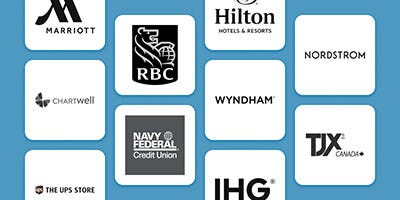
The modern workplace has the reputation of being sterile, cold, and professional, devoid of human feeling and empathy. But if most people see it this way, how can your staff care enough to help your business succeed?
Fostering a sense of belonging and engagement among employees is crucial for organizational success. There are many ways to engage staff and employees, but it does not need to be a big event or step. It can be a small tool but still powerful in achieving your employee engagement goals: the humble employee name badge.
Beyond being a mere identification tool, customizing name tags can significantly boost morale and create a more inclusive and vibrant workplace culture.
The Power of Personalization
Employee name badges have come a long way from being simple identification tags. Personalization involves going beyond just displaying a name and title; it's about recognizing and celebrating the unique qualities that each employee brings to the table.
But it’s not just the addition of names and company roles. You can incorporate elements such as hobbies, interests, skills, or achievements onto the name tags. Doing so allows organizations to communicate a message of appreciation and acknowledgment, not only from management to staff, but also from employee to employee.


Boosting Morale
When employees see their individuality reflected on their name tags, it can have a profound impact on their morale. It sends a message that the organization values them not only for their professional contributions but also as individuals with unique personalities and interests.
Employee name badges foster a sense of unity and belonging, significantly boosting morale within a workplace. When individuals are addressed by name, it creates a personalized and inclusive environment.
Colleagues and clients alike can easily establish connections, promoting a friendly and approachable atmosphere. Knowing and using each other's names enhances teamwork and communication, breaking down barriers.
Additionally, badges acknowledge the importance of each employee's role, instilling a sense of pride and recognition. This simple yet effective practice contributes to a positive work culture, reinforcing camaraderie and ultimately elevating overall morale in the workplace.


Fostering a Sense of Belonging
Personalized employee name badges and tags play a crucial role in creating a sense of belonging among employees. Seeing shared interests or hobbies on a colleague's badge can spark conversations and connections that extend beyond work-related topics.
A connected and inclusive environment promotes job satisfaction, reduces turnover, and enhances collaboration. Name badges break down barriers, making it easier for colleagues to address each other by name, fostering familiarity and camaraderie.
When employees feel recognized and valued through such simple yet powerful tools, they are more likely to engage actively in the workplace community. Ultimately, name badges contribute to a positive company culture, creating a sense of belonging that strengthens teamwork and employee loyalty.


Adding employee hobbies and interests in a name badge can enhance workplace dynamics because it can promote individuality and spark conversations. It humanizes the work environment, fostering connections beyond professional roles.
To address privacy concerns, employees should have the autonomy to choose the information displayed. An opt-in system, where individuals decide what personal details to share, ensures respect for privacy.
Additionally, companies can provide guidelines to maintain appropriateness. Striking the right balance between personalization and privacy not only enriches workplace relationships but also creates a more vibrant and inclusive atmosphere, where employees feel valued for their unique qualities both inside and outside the office.


Beyond personal interests, showcasing professional skills and achievements on name tags can be a powerful motivator. When employees see their accomplishments displayed for others to recognize, it not only boosts their confidence but also fosters a culture of achievement and continuous improvement.
It publicly acknowledges and celebrates individual successes, instilling a sense of pride and recognition. This visible appreciation creates a positive feedback loop, motivating employees to strive for excellence.
It not only elevates the honored employee's morale but also inspires others to contribute their best. The name badge becomes a symbol of accomplishment, fostering a culture that values and celebrates success.
In turn, this recognition contributes to a more motivated and engaged workforce, enhancing overall employee morale and creating a workplace environment where achievements are not only valued but prominently celebrated. This can contribute to a positive competitive spirit within the organization, driving individuals to strive for excellence.


Improving Communication and Team Dynamics
Personalizing name badges enhances communication and team dynamics by fostering a more approachable and relatable workplace atmosphere. When employees share personal details on badges, it provides conversation starters, breaking down communication barriers.
This openness promotes a culture of collaboration, as individuals feel more comfortable engaging with colleagues on a personal level. Recognizing shared interests or hobbies builds connections beyond professional roles, ultimately strengthening teamwork.
Make Your Name Badges Work for Your Organization
Organizations should recognize the potential of personalized name tags as a simple yet impactful tool. Customizing name badges with what your employees value, organizations can foster a sense of belonging.
These tools can promote a culture where individuals are valued not just for their professional contributions but for the unique qualities that make them who they are. In doing so, organizations can create a more vibrant, connected, and fulfilling work environment for their employees.

 Imprint Plus Canada
Imprint Plus Canada
